Alcohol can weaken your gut barrier by damaging the tight junctions between intestinal cells, increasing permeability. This allows toxins, bacteria, and undigested food to pass through, triggering inflammation, symptoms like bloating, fatigue, skin issues, and mood swings. Over time, this damage raises health risks, including autoimmune diseases, nutrient deficiencies, and chronic illnesses. Staying mindful of your alcohol intake and adopting supportive lifestyle habits can help protect and repair your gut. Learn more to understand how to keep your gut healthy.
Key Takeaways
- Alcohol damages tight junctions between intestinal cells, increasing gut permeability and leading to a leaky gut.
- It activates inflammatory pathways, releasing cytokines that weaken the gut barrier.
- Chronic alcohol consumption promotes oxidative stress, further harming gut lining cells.
- Increased gut permeability allows toxins and bacteria to enter the bloodstream, causing health issues.
- Limiting alcohol intake and supporting gut health with lifestyle changes and supplements can reduce permeability.
The Role of the Gut Barrier in Overall Health
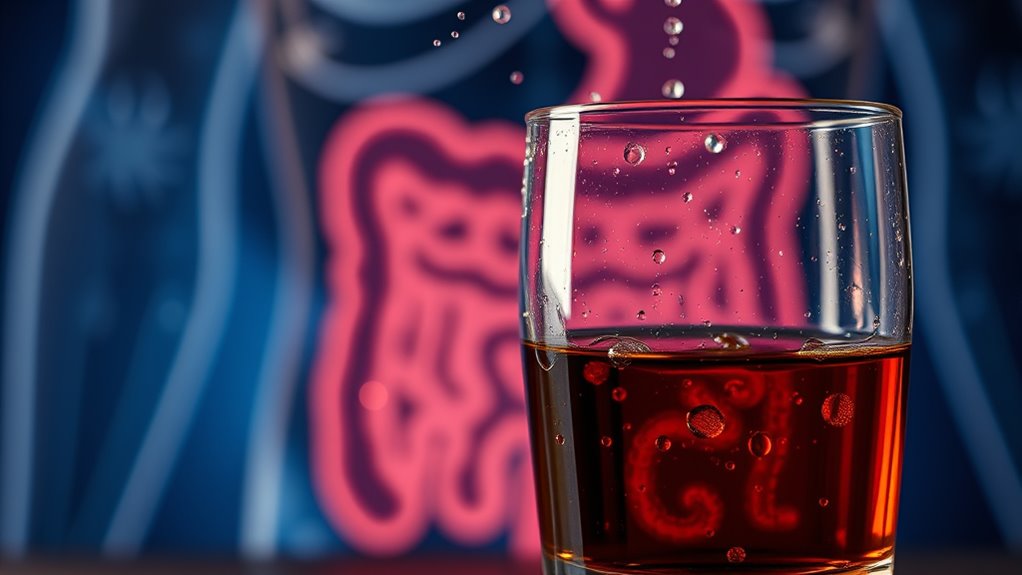
The gut barrier plays a crucial role in maintaining overall health by controlling what passes from your intestines into your bloodstream. It acts as a selective filter, allowing nutrients to enter while blocking harmful substances like toxins and bacteria. This barrier is made up of tightly connected cells that prevent unwanted particles from slipping through. When the gut barrier functions properly, it keeps your immune system balanced and reduces inflammation. Conversely, if the barrier weakens, harmful substances can leak into your bloodstream, triggering immune responses and potentially leading to health issues like infections, allergies, or chronic inflammation. Maintaining a healthy gut barrier is essential for overall well-being, as it safeguards your body from internal threats and supports ideal nutrient absorption.
How Alcohol Disrupts Intestinal Integrity
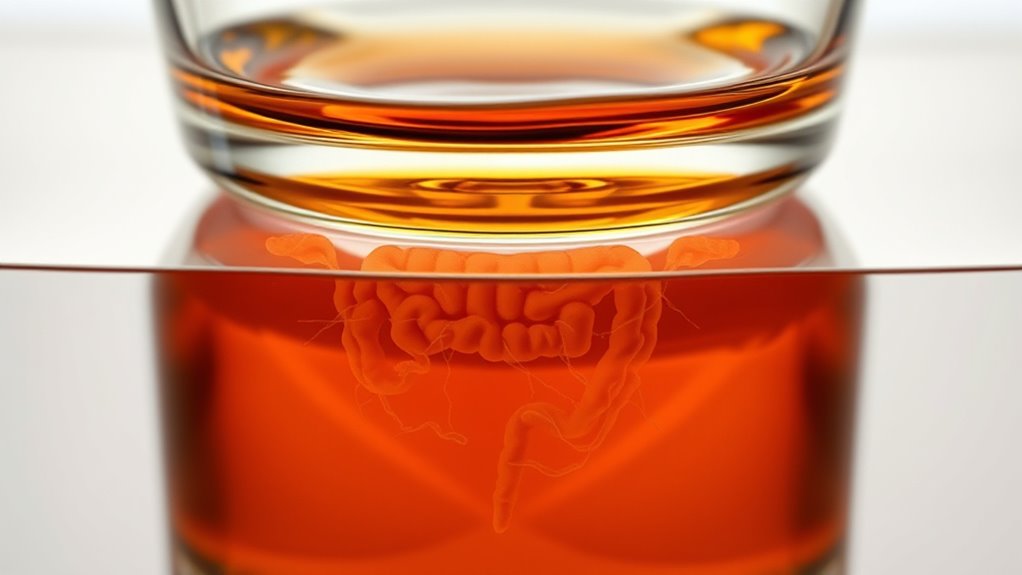
Alcohol consumption can considerably impair the integrity of your gut lining, making it more permeable than it should be. When you drink, alcohol damages the tight junctions between your intestinal cells, weakening the barrier that prevents harmful substances from entering your bloodstream. This disruption allows toxins, bacteria, and undigested food particles to slip through, provoking inflammation and immune responses. Alcohol also triggers oxidative stress, which further harms the cells lining your gut. As your gut becomes more permeable, you may experience symptoms like bloating, discomfort, and increased susceptibility to infections. Repeated alcohol exposure can also lead to long-term damage to your gut’s barrier function, increasing the risk of chronic health issues. Understanding how alcohol impacts your gut’s structure highlights the importance of moderation or abstinence for maintaining intestinal health.
The Biological Mechanisms Behind Increased Permeability
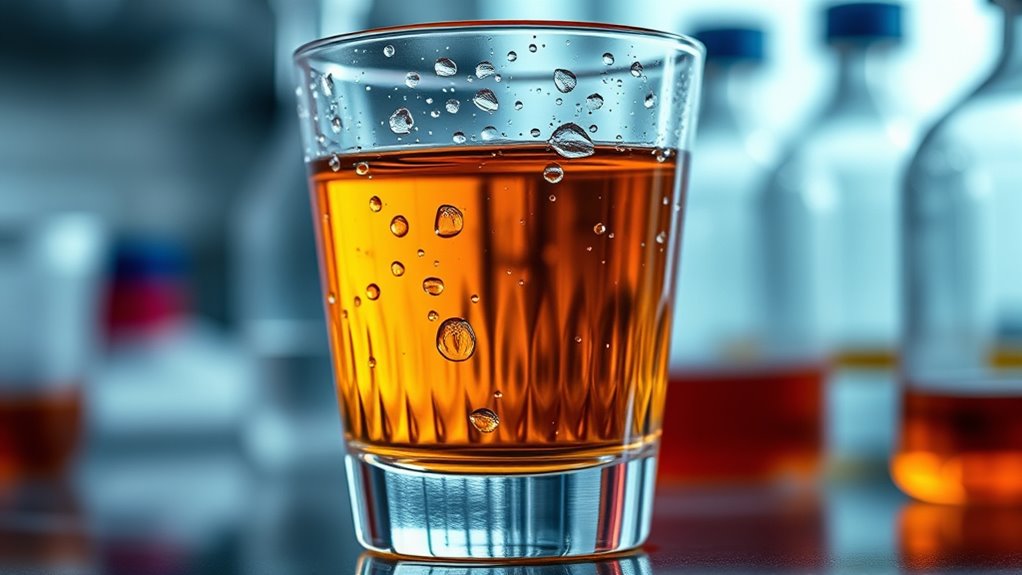
Understanding how alcohol increases gut permeability requires examining its effects on cellular structures and signaling pathways. Alcohol damages tight junction proteins, which act as gatekeepers between intestinal cells, making the lining more permeable. It also triggers inflammatory responses by activating pathways like NF-κB, leading to cytokine release that further weakens the barrier. Additionally, alcohol causes oxidative stress, damaging cell membranes and disrupting cellular functions. Here’s a quick look at these mechanisms:
| Mechanism | Effect |
|---|---|
| Tight Junction Disruption | Increased gaps between cells, allowing substances through |
| Inflammation Activation | Cytokine release weakens barrier integrity |
| Oxidative Stress | Cell damage impairs barrier function |
Furthermore, alcohol can impair gut barrier integrity, exacerbating permeability issues and contributing to various health problems.
Symptoms and Signs of a Leaky Gut

Many people with a leaky gut notice a range of symptoms that can often be mistaken for other conditions. You might experience bloating, gas, or abdominal discomfort after eating. Fatigue and brain fog are common, leaving you feeling sluggish or unfocused. You could notice food sensitivities or cravings that seem out of place. Skin issues like rashes, acne, or eczema might appear unexpectedly. Mood swings, anxiety, or depression can also signal gut imbalance. Additionally, you may have frequent infections or illnesses because your immune system struggles to respond properly. These symptoms often develop gradually, making it hard to pinpoint the cause. Recognizing these signs early can help you address gut health before more serious issues develop. Understanding the role of gut permeability in overall health is crucial for effective management.
Long-Term Health Risks Associated With Alcohol-Induced Gut Damage

Prolonged damage to your gut lining from alcohol consumption can lead to serious long-term health issues. When your gut barrier weakens, harmful substances like bacteria and toxins can enter your bloodstream, fueling chronic inflammation. This inflammation may contribute to conditions such as autoimmune diseases, nutrient deficiencies, and metabolic disorders. Over time, alcohol-induced gut damage increases your risk of developing liver disease, cardiovascular problems, and even certain cancers. You might also experience persistent fatigue, cognitive decline, and immune system impairment. Recognizing these risks helps you understand the importance of protecting your gut health. Staying mindful of your alcohol intake and supporting gut repair can mitigate these long-term dangers. AI-driven diagnostics and personalized health insights are emerging tools in managing and understanding gut health risks.
Factors That Influence Susceptibility to Gut Permeability

Your susceptibility to increased gut permeability varies based on multiple factors that influence how your gut lining responds to alcohol and other stressors. Genetics play a role, as some people naturally have weaker gut barriers or immune responses. Your diet also matters; a diet high in processed foods, sugar, or low in fiber can weaken the gut lining, making it more prone to permeability. Additionally, your existing gut health, including the balance of beneficial bacteria, influences vulnerability. Stress levels and overall inflammation can compromise the barrier function, increasing susceptibility. Age and certain medical conditions, like inflammatory bowel disease or celiac disease, further heighten risk. Understanding these factors helps you recognize why some individuals are more affected by alcohol’s impact on gut permeability than others.
Strategies to Protect and Repair Gut Barrier Function
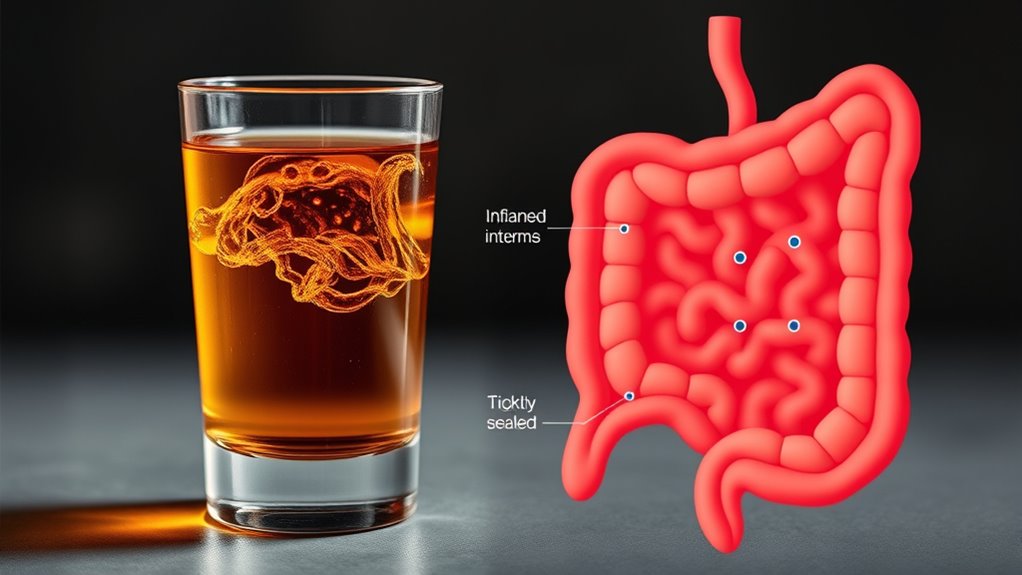
To protect and repair your gut barrier, start by including gut-friendly foods like fiber-rich vegetables and fermented products. Limiting alcohol intake also helps reduce stress on your gut lining. Additionally, targeted supplements can support healing and strengthen your gut’s defenses. Using prebiotics and probiotics can also promote a healthy microbiome, which is essential for maintaining gut integrity.
Incorporate Gut-Friendly Foods
Incorporating gut-friendly foods into your diet can substantially strengthen and repair your intestinal barrier. Focus on nutrient-dense options that support gut health and reduce inflammation. Fermented foods introduce beneficial probiotics that promote a healthy microbiome, aiding in barrier repair. Bone broth provides collagen and amino acids that help strengthen intestinal lining. Fiber-rich foods like vegetables and fruits feed good bacteria and improve gut motility. Polyphenol-rich foods, such as berries and green tea, combat oxidative stress. Additionally, healthy fats from avocados and nuts support cell repair and reduce inflammation. Making these foods a regular part of your diet can enhance gut integrity, minimize permeability issues, and set the stage for overall digestive health. Vetted probiotics and nutrient-dense choices play a crucial role in supporting gut health.
Limit Alcohol Consumption
Excessive alcohol intake can compromise your gut barrier, increasing permeability and allowing harmful substances to enter your bloodstream. To protect your gut, it’s essential to limit your alcohol consumption. Set clear boundaries—choose alcohol-free days or reduce your intake gradually. Be mindful of portion sizes and avoid binge drinking, which causes greater damage. Consider replacing alcoholic drinks with healthier options like herbal teas or sparkling water. Staying within moderate drinking guidelines helps minimize inflammation and prevents further damage to your gut lining. Remember, even small reductions can have a significant impact on gut health. By consciously limiting alcohol, you give your gut a better chance to heal, maintain integrity, and function at its most effective. Protecting your gut barrier starts with mindful drinking habits and understanding the importance of gut health in overall well-being.
Use Targeted Supplements
Targeted supplements can play a crucial role in reinforcing and repairing your gut barrier. They supply essential nutrients that support gut health and reduce permeability caused by alcohol. Incorporating the right supplements can help restore balance and protect your gut lining. Consider adding these to your routine:
- L-glutamine to fuel intestinal cells and promote healing
- Probiotics to restore healthy gut bacteria
- Zinc to support immune function and gut integrity
- N-acetylcysteine (NAC) to combat oxidative stress
- Vitamin D to modulate immune responses and inflammation
- Understanding cookie consent management can help you make informed decisions about supplement information and privacy considerations.
Using these supplements strategically can accelerate recovery, strengthen your gut barrier, and reduce alcohol-related damage, ultimately improving your overall digestive health. Always consult with a healthcare professional before starting new supplements.
The Impact of Lifestyle Choices on Gut Health
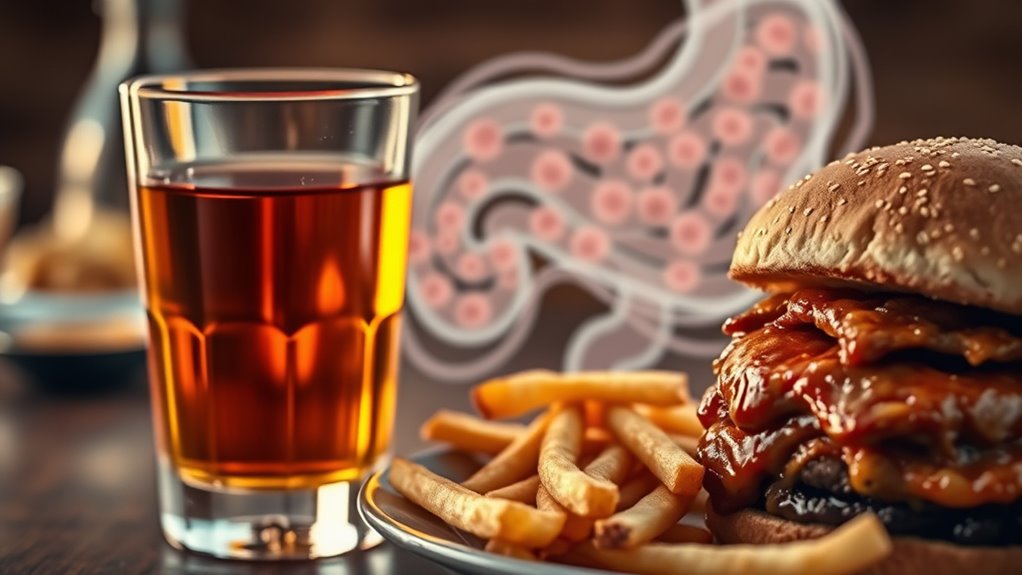
Your lifestyle choices substantially influence gut health, affecting the permeability of your intestinal lining. Poor diet, stress, lack of sleep, and sedentary habits can weaken your gut barrier, making it more prone to leaks. Consuming processed foods, high sugar, and excessive alcohol increases inflammation and disrupts your microbiome balance. Chronic stress releases cortisol, which impairs gut function and promotes permeability. Not moving enough reduces circulation and hampers gut repair processes. Additionally, a lack of color accuracy can make it difficult to assess inflammation or other issues within the gut visually. Conversely, eating a nutrient-rich diet, staying active, managing stress, and prioritizing sleep strengthen your gut barrier, supporting healthy microbiota and reducing inflammation. Making mindful lifestyle choices empowers you to protect your gut, prevent permeability issues, and promote overall health. Small changes can have a significant impact on your gut’s integrity and your well-being.
Frequently Asked Questions
Can Alcohol Consumption Be Completely Avoided to Prevent Gut Permeability?
You might wonder if avoiding alcohol entirely can prevent gut permeability. While abstaining from alcohol reduces the risk, it’s not a guaranteed solution, since other factors like diet, stress, and medications also influence gut health. To protect your gut, focus on a balanced diet, manage stress, and limit alcohol intake as much as possible. Consistency helps maintain gut integrity, but complete avoidance isn’t always necessary if you adopt healthy habits.
Are There Specific Foods That Worsen Alcohol-Related Gut Damage?
You ask if certain foods worsen alcohol-related gut damage. While avoiding alcohol is key, some foods can aggravate the issue. Spicy, greasy, or highly processed foods may inflame your gut lining, making damage worse. Sugary snacks and refined carbs can also promote inflammation. Instead, opt for nutrient-rich, anti-inflammatory foods like fruits, vegetables, and lean proteins to support your gut’s healing process and reduce further harm caused by alcohol.
How Quickly Can Gut Permeability Improve After Quitting Alcohol?
Imagine you’re in a time machine, and within weeks of quitting, your gut’s healing process kicks in. Usually, you can notice improvements in gut permeability within a few days to weeks, depending on your overall health and lifestyle choices. You’ll start feeling better as inflammation decreases and gut lining repairs itself. Just stay consistent, nourish your body, and give your gut the time it needs to bounce back.
Is There a Genetic Predisposition to Alcohol-Induced Gut Issues?
Genetic factors can influence how your body responds to alcohol, including its effects on your gut health. Some people might have a predisposition due to inherited traits that make their gut lining more vulnerable or their immune response more reactive. If you have a family history of gut issues or alcohol sensitivity, you might be more prone to alcohol-induced gut problems. Knowing your genetics can help you make better health choices.
Do Different Types of Alcohol Affect Gut Permeability Differently?
Different types of alcohol can affect your gut permeability in various ways. For example, spirits with higher alcohol content, like vodka or whiskey, tend to cause more gut irritation than lower-proof drinks or those mixed with non-alcoholic ingredients. Beverages high in sugar or additives may also worsen gut permeability. To protect your gut health, it’s best to moderate your alcohol intake and choose drinks that are gentler on your digestive system.
Conclusion
Think of your gut as a delicate fortress guarding your health. When alcohol weakens its walls, leaks and vulnerabilities follow, risking your well-being. But you hold the key to restoring its strength—by choosing nourishing habits and mindful choices. Protect your fortress, reinforce its defenses, and keep your inner world resilient. Remember, a resilient gut is the foundation of a thriving life—stand guard, and let your vitality shine through its unbreakable walls.









